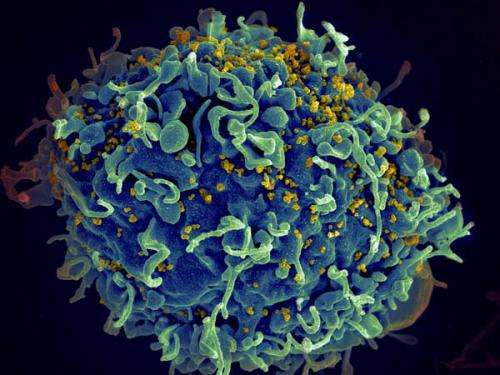Researchers propose novel solution to HIV prevention

Enemas are commonly used by men who have sex with men (MSM) and transwomen (TW) before sexual intercourse. But these groups are vulnerable to HIV and a host of other sexually transmitted infections because enemas—even those that use tap water—can seriously damage the thin tissue lining the rectum, allowing for easier transmission of harmful viruses and bacteria.
A research group that worked recently with Peruvian MSM and TW now proposes an approach: a rectal microbicide formulated as an enema to prevent HIV and possibly other sexually transmitted infections.
"A douche-based rectal microbicide that is safe and effective could play an important role by providing another HIV prevention option for these highly vulnerable groups," said Brandon Brown, an assistant professor in the School of Medicine at the University of California, Riverside, who led the research project. "In view of the expanding global HIV epidemics in MSM and TW, there is an urgent and immediate need for novel HIV prevention options, such as the douche-based rectal microbicides we propose, that can be readily incorporated into existing sexual practices."
Study results appeared online this week in AIDS and Behavior.
"While we conducted the study among MSM and TW in Peru, our findings may extend to these groups locally and globally," said Brown, a member of the Center for Healthy Communities at UCR. "Unfortunately, little is known about rectal douching practices among these groups and the damage such practices may cause."
For the study, the team led by Brown examined during February 2012-February 2013 the prevalence of enema use among 415 MSM and 68 TW in Lima, Peru. Participants completed a self-administered interview on rectal douching practices to inform rectal microbicide douche development. In the previous 6 months, 18 percent of participants reported rectal douching, and those who reported douching were mainly those who had some receptive sexual role.
"We found that men who douched prior to sex did it primarily for hygiene and pleasure. We should capitalize on these reasons to increase this practice and eventually include a rectal microbicide for HIV prevention," Brown said.
The study was conducted in Epicentro, a gay men's health center in Lima that provides free and low-cost health and social services for MSM and TW. During the study period, the researchers invited MSM and TW who attended Epicentro for any reason to participate in the study. The researchers also recruited participants at bars, clubs and volleyball courts frequented by MSM and TW, and via social media. Participants referred other MSM and TW to the study.
"Based on the findings from this study and previous studies on rectal microbicides, we need to learn more about the sexual practices and beliefs among diverse MSM and TW," Brown said. "In the absence of the availability of oral antiretroviral pre-exposure prophylaxis or PrEP in Peru and globally we need to explore additional venues for HIV prevention. Rectal microbicides are one possible cost-effective tool to prevent HIV."
Brown explained that oral PrEP may not be for everyone, and not all MSM and TW use lubes for sex.
"The more we know about rectal douching practices, the better situated we will be for developing interventions with rectal microbicides," he said.
He was joined in the study by Jerome T. Galea (first author of the research paper), who has a strong history of working on rectal douching and rectal microbicides for development of HIV interventions, and Segundo R. Leon at Socios En Salud, Lima, Peru; Janni J. Kinsler at UCLA; Sarah McLean at Fenway Health, Boston, Mass.; and Gino Calvo and Hugo Sánchez at Epicentro Salud, Lima, Peru.
Brown received funding for the study from Merck & Co., Inc. and the National Institutes of Health.
More information: Jerome T. Galea et al. Rectal Douching Prevalence and Practices Among Peruvian Men Who have Sex with Men and Transwomen: Implications for Rectal Microbicides, AIDS and Behavior (2015). DOI: 10.1007/s10461-015-1221-9


















